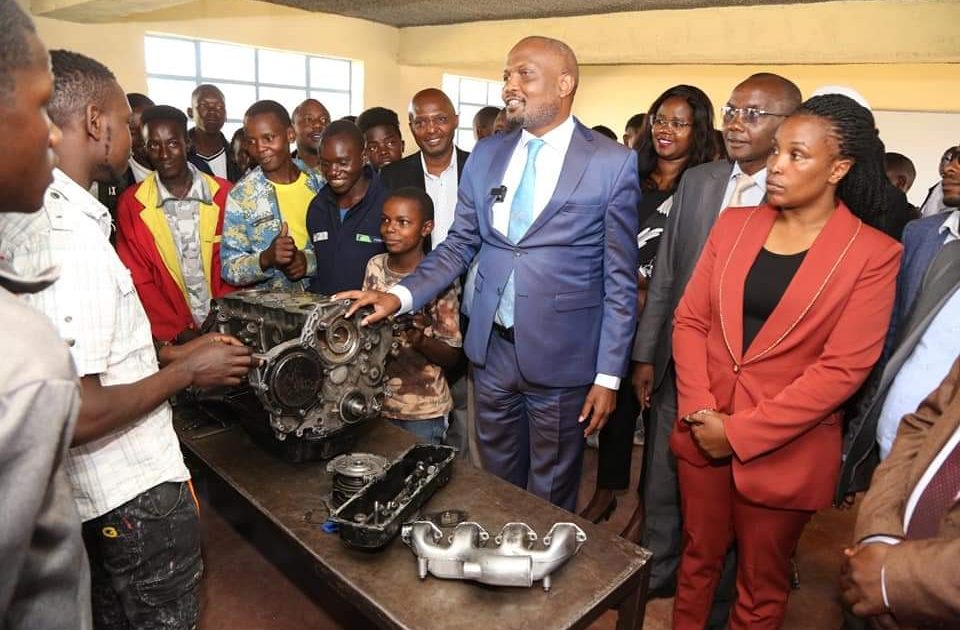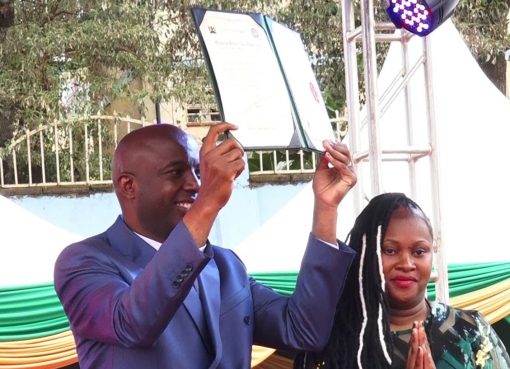The Government is working on a training collaboration between the National Youth Service (NYS) and 1,500 rural based Vocational Training Centres (VTCs), operated by Counties towards ending the mismatch between skills youth graduate with and industry needs.
Public Service, Performance and Delivery Management, Cabinet Secretary (CS), Moses Kuria, said through the partnership which is subject to approval by Council of Governors (CoG) tutors in the targeted VTCs will be equipped with capacity to anticipate and be aware of local, regional and global labour market dynamics.
The VTCs were previously, either referred to as youth or village polytechnics.
The CS stated that collaboration between NYS and VTCs, will provide a platform for young people to showcase their innovations and talents and connect them with mentors and potential employers.
There are four to five million unemployed youth in Kenya. This is more than 39 percent of the country’s youth population.
According to a study by the Ministry of Labour and Social Protection of the factors contributing to the situation, lack of skills tops the list.
Speaking when he inspected six facilities in Nakuru County that included Njoro VTC, Kipsyenan VTC in Rongai, Bondeni VTC in Nakuru Town East, Kagoto Dhanji VTC in Bahati, Mbegi VTC in Gilgil and Mirera VTC in Naivasha, Mr Kuria said the VTCs though autonomous will act as branches of NYS.
The CS said the facilities will be equipped with modern training equipment and staff to enable them to equip youth with skills required to increase productivity, raise income levels and increase access to employment.
Kuria who was accompanied by Deputy Governor, Mr David Kones, indicated that to guarantee continuous transfer of technology, there will be collaborations with industry.
Mr Kuria further disclosed that Biometric Centres will be established at all the VTCs where personal details of trainees will be captured and forwarded to the Immigration Department, which in turn will process passports for all the learners.
For Kenya to realise Vision 2030, Mr Kuria noted that there has to be a focused attention towards building the human capital that will drive the industries, through skills development.
Primarily, he added, the manufacturing sector is the guaranteed provider of productive, sustainable jobs.
“We cannot solve the unemployment problem in the country with rudimentary skills; we must secure the future of industry through practical cutting-edge skills for job creation,” observed the CS.
He assured that the National government would encourage devolved units, to improve and expand infrastructure in the facilities, while the State would ensure that learning resources are updated, increased and fully utilised.
According to Kuria, the move seeks to provide young people with competitive skills for self-employment or jobs in the informal sector, addressing unemployment as well as the shortage of technical skills in domestic and commercial sectors.
In the recently concluded NYS recruitment exercise, CS Kuria, asserted that, he directed a robust strategy to ensure a transparent process.
He revealed that he instructed the recruitment to be done at the ward level, based on population density.
“I am the first person to do recruitment fairly and equally based on a scientific empirical formula,” Kuria said.
CS mentioned that he employed census data, to evaluate the population density in each ward.
He said the approach enabled him to allocate the appropriate percentages of individuals to be recruited from specific wards.
“We have got the population density as per the census for every ward and then I assigned them some percentage. Math is my forte so I told them no…this particular ward has this density and these are the people,” Kuria said.
The NYS recruitment took place from February 5-9, 2024, seeking to have at least 15,000 recruits.
Kuria assured that he would continue being firm and protecting the rights of the children of the poor in the country, by ensuring they get their rightful share of NYS slots, during future recruitments.
He indicated that NYS plans to increase the number of recruits to 50,000 a year starting next year and 100,000 by 2027.
Kuria said the government has expanded the training facilities to accommodate the increased number of recruits.
“The National Youth Service (NYS) training facility will now be able to accommodate about 50,000 recruits,’’ he revealed.
Through partnership with the private sector, he added, NYS has embarked on a dual training model, an initiative aimed at linking industries with training institutions, to offer learners hands-on experience, necessary to fit in the modern job market.
He emphasized the Ministry’s commitment to working with the institutions, the private sector, and the donor community, to realize hands-on training.
The Deputy Governor noted that each year, one million young Kenyans enter the labour market, majority of whom lack the hands-on experience to meet the evolving work environment.
“These bright and eager minds hold immense potential, but they require the necessary skills and training to excel in an ever-evolving world. The responsibility for equipping young individuals with the essential skills they need to thrive, addressing youth unemployment, and ensuring socio-economic stability within the nation lies primarily within VTCs and TVETS,” he said.
“However, it is equally vital for companies and business membership organizations to play their role in the skill development of the country’s youth. They should collaborate closely with the TVET sector, both at the organizational level and on a broader scale,” added Mr Kones.
Through the proposed partnership, Mr Kones stated that both levels of government can collectively cultivate a competitive and employable workforce.
The effort, he added, was not just a responsibility, but also a vital interest for both industry and the nation as a whole.
“Today, new technologies, higher quality standards in world markets, flexible production processes, the pressure of global competition, the emergence of e-commerce and industry mean that the skill level for gaining and maintaining a competitive edge in businesses and industries is rising continuously.”
Mr Kones observed that investment in skill development played a very important role in the Asian Tiger economies and the earlier miracles in the development of the Japanese and North American economies.
The Deputy Governor said there is need for young people to discard the notion that vocational education is an inferior education option.
“As a country, we indeed face the possibility of a ‘skill divide’, which will be even more threatening to our development prospects than the ‘digital divide’.
He declared that the partnership will enable the youth to be equipped enough to be absorbed in the manufacturing sector as competent employees.
By Anne Mwale





